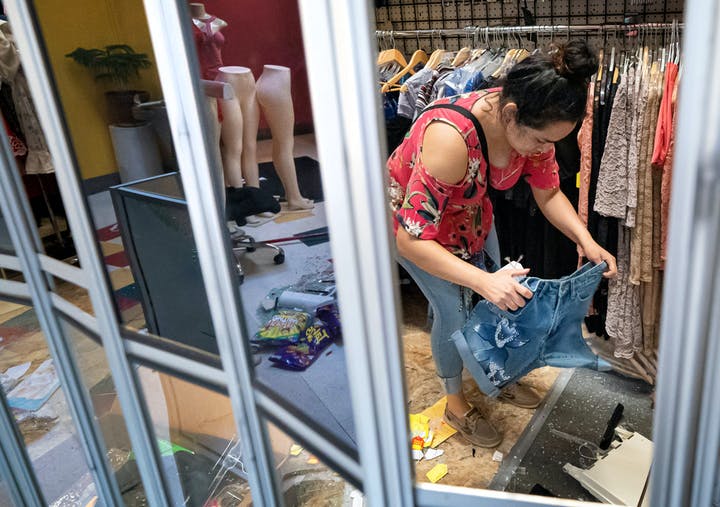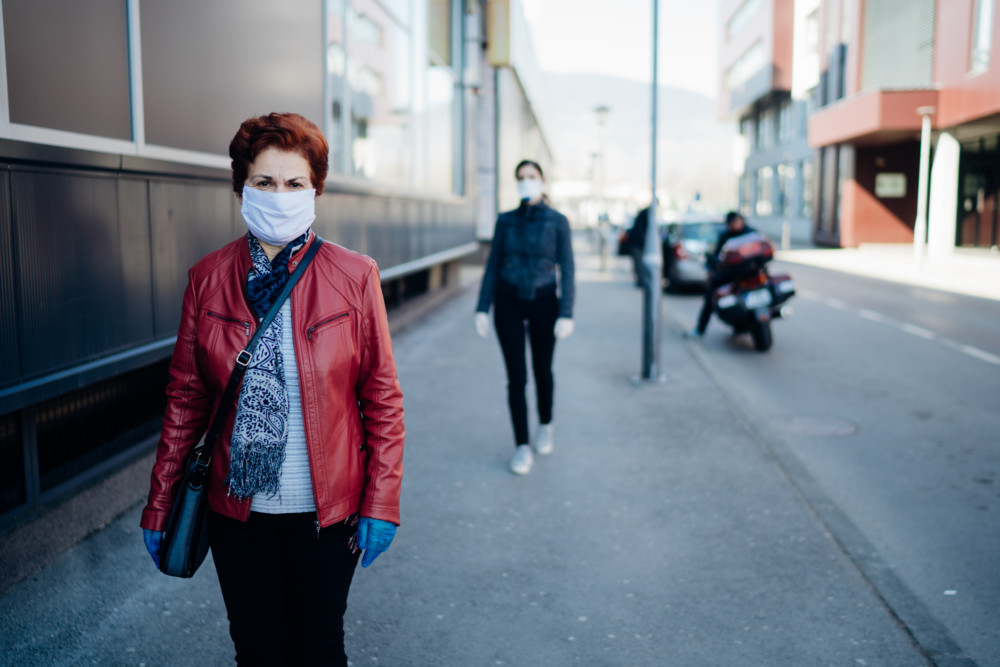By Joseph N. DiStefano
The Philadelphia Inquirer
WWR Article Summary (tl;dr) Joseph N. DiStefano takes a look at the challenges retailers face as they try to reopen from Covid_19 and in some cases, damage from looting and vandalism.
Philadelphia
Store owners that bet big on the resurgence of retail in U.S. cities were prime victims of the burst of looting and vandalism that accompanied the initial protests about the police mistreatment of black citizens.
Will they rebuild? Many chains have already reopened most of their damaged outlets, where sales had been poor to nonexistent all spring due to coronavirus closures. Long-term prospects, and the future of local and independent stores, are less assured, as owners and insurers count claims and weigh the challenges facing retail trade.
One observer with a wide-lens perspective is Sheldon Yellen, whose Michigan-based business employs 9,200 people cleaning up storm, accident and other disaster scenes in North America, Europe and Asia.
Yellen is upbeat, at least about the prospects for national firms.
“A lot of people are immediately rebuilding,” he says. “The bigger chain organizations say, ‘Get us dried out, make sure there’s no mold, clean us up for COVID, get us new glass.'”
Yellen said big operators are discounting fears of renewed riots. He points out that lawlessness and property damage abated quickly even as protests continued.
In Philadelphia, Dunkin says, no fewer than 40 of its 113 coffee-doughnut-sandwich stores were damaged in looting. Most have cleaned up and reopened. As for long-term plans, the franchisees who run local stores “are solely responsible for making their own business decisions, including safety and security practices,” said spokeswoman Michelle King.
DTLR Villa, a Baltimore-based chain that sells clothing and footwear to urban shoppers, says that 93 of its 244 stores nationwide were damaged by looters, including four that were burned down — in Chicago; Minneapolis; Richmond, Va.; and Philadelphia’s Olney section.
“The plan is to reopen all of them, minus the ones that burnt down. We have to assess those situations,” said Jeff Bowden, executive vice president. “We’re in communities we want to work with.”
His company, like other retailers and the insurers who pay their claims, is expected to reveal more more about damages and plans after June 30 as public companies begin informing stockholders about spring sales, as well as expenses and profits.
Starbucks, whose coffee shop on City Hall Plaza was among the first sites burned as protests spread May 30, said Wednesday in a statement that didn’t mention the looting that it has decided to close up to 400 company-owned stores “primarily in U.S. urban markets,” while opening others “in different locations.” Starbucks operates 10,000 stores nationwide and closes and opens several hundred stores annually.
Foot Lockers in several sections of Philadelphia and in Atlanta, Chicago, New York and other cities were reported stripped of merchandise. The company didn’t return calls seeking comment.
“I could understand, to a degree, why a Foot Locker could be looted: the overpriced shoes, and the way children have killed each other for them, for the past 30 years,” said the Rev. Mark Tyler, pastor of Mother Bethel African Methodist Episcopal Church, after witnessing looting. He added that attacks on neighborhood small businesses were harder to understand.
CVS Health says 400 of its nearly 10,000 U.S. drugstores across the nation were hit by looters; fewer than 40 remained closed as of Tuesday, and most of those were expected to reopen this week, said spokeswoman Amy Thibault.
RiteAid said it was still assessing the damage after city stores from Hollywood, Calif. to Philadelphia’s Germantown section were stripped of drugs and merchandise.
Philadelphia-based Five Below saw its Philadelphia stores on Chestnut Street and Aramingo Avenue looted. The company had a “experienced a lot of disruption related to the protests that impacted sales,” chief executive Joel Anderson told investors in a conference call Tuesday, He said he was still reviewing both coronavirus and looting losses.
Urban Outfitters stores were reported looted in Los Angeles, Phoenix, New York and other cities, as well as in Philadelphia, the retail group’s hometown. The company hasn’t commented on the impact. But on Wednesday, the firm’s New York landlord sued Urban Outfitters for stopping paying rent at its HeraldSquare store and restaurant in Manhattan after they were sacked by looters June 1, Bloomberg LP reported.
The looting followed nearly three months of coronavirus shutdowns that have already left retailers far behind for the year. Insurers have said they expect coronavirus losses will be significantly greater than looting and arson and related business-interruption claims, because the anti-viral closings went on for months. The industry posture has been that it will over looting damages, but not the far greater toll from the virus.
All the damage has meant dollars for a few specialized businesses. Among them is Yellen’s Belfor, Inc., the international cleanup company.
His crews of up to four workers have “hung somewhere around 1,500 heavy four-foot-by-eight-foot sheets of plywood” on businesses in Center City and elsewhere in the city since May 31, said Yellen, the chief executive. Belfor’s offices serving the Northeast states are in Exton.
While major national firms are largely bulling ahead, Yellen said smaller firms are more hesitant.
“People are still not over the COVID-19 issue. Then, you got the pressure of, what is retail going to look like? We all know what online retail is doing to storefronts. And when you’re talking about entrepreneurs, it’s, ‘Can I keep going, or do I need to do something else to feed my family?'”
Retail chains “took a step back but they aren’t giving up,” said Bob Almond Jr., co-owner of Nest, a 200-employee firm in Gloucester City, N.J., that arranges clean-ups.
He’s not worried about large, well-funded chains such as his client Party City, but about the many smaller retailers whose sales were already down.
“There are bankruptcies left and right,” Almond said. “There will be some more.”
A lot will depend on insurers. Companies are speeding to adjust claims, handicapped a bit by lingering coronavirus restrictions on their activity, said Sean Brogan, managing director at Graham Co., a Philadelphia-based commercial insurance brokerage.
Brogan is urging clients to “document everything,” to take pictures and videos and note the loss of inventory and building damage, just as they might for a storm-damage claim.
What’s not clear, he added, is whether insurers will push urban stores to invest in expensive new security measures to reduce future claims. Such extra-careful underwriting is more likely, because the U.S. property insurance business have already faced three years of “huge catastrophic losses” from storms and other large claims, Brogan added.
Philadelphia Councilman David Oh (R., at-large) whose political base includes many storekeepers who are relatively recent immigrants, says he’s worried many won’t reopen.
“A lot of store owners are older,” he told me. “Having a small business is really taxing. You get up early. You stay up late. You have the stress and the crime. And you are coming off COVID-19, when not even the criminals were making money. And now their stores have been damaged. Will they come back?”
About a third of the 100-member Korean Beauty Supply Association reported damage to stores after the recent protest, says Sharon Hartz, president of the Korean American Association of Greater Philadelphia. “We have no people injured. But the looters took everything,” and some owners are not sure they want to return, she said.
Hartz recalls calling police over four days, from May 31 to June 3, because looters were targeting stores on Cheltenham Avenue. “But no one came,” he said. So owners in outlying neighborhoods “are afraid. What can they expect for the future?”
___
Distributed by Tribune Content Agency, LLC.















































































































































































































































































































































































